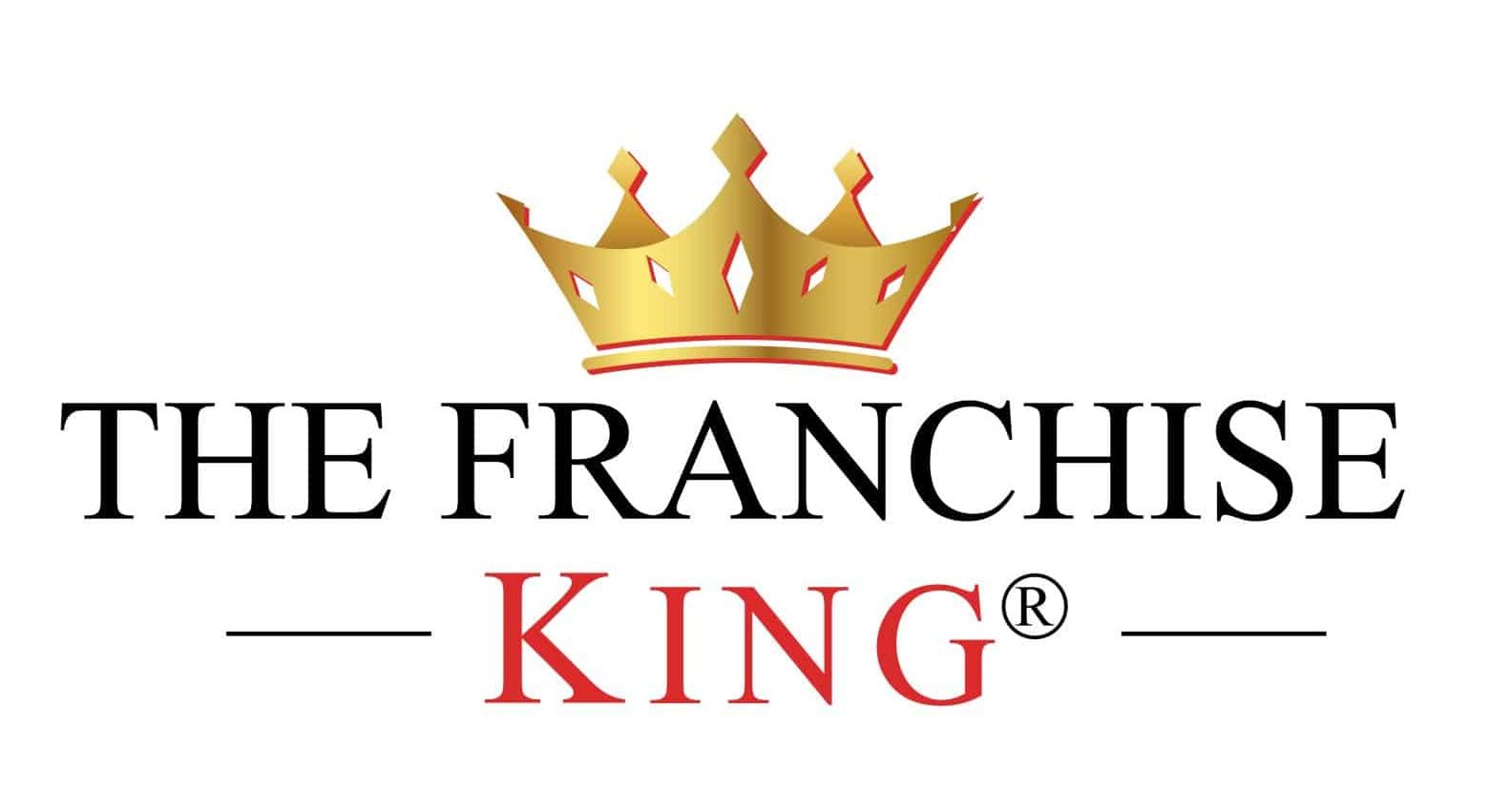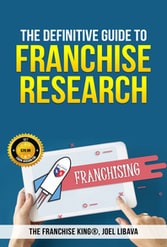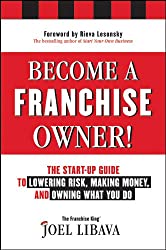This is a guest post from Andy Sack, co-founder of Lighter Capital
I’ve been an entrepreneur for almost twenty years, primarily working on web startups. Through my experience in the startup space, I’ve met and worked with entrepreneurs of all shapes and sizes, including franchise owners, and I know how confusing and frustrating it is to find a way to finance your business – whether it’s a startup, small business or a franchise.
After following The Franchise King for a while now, I thought I’d discuss some of the important financing concepts related to franchising for people who follow this blog, and Joel thought so too!
To give some background, I’d financed my previous companies using equity financing, where you sell shares of your company to get funding. There are pros and cons to giving up ownership of your company to a venture or angel investor, but among the limitations, is that these investors tend to be picky about investments, hard to reach, and end up with some degree of control over your company.
Bootstrapping ain’t easy, but it keeps your freedom
The simplest way to fund a franchise is bootstrapping – fund the franchise yourself. Now, the obvious response to this is the whole “if I had the money, I wouldn’t need funding” part. But I wanted to both highlight some of the benefits of bootstrapping, and explain why it’s the most common option for new franchise owners to think consider.
The biggest advantage is that bootstrapping, by definition, doesn’t have any gatekeepers you need to depend on before you can get going. When you’re an entrepreneur, nobody is going to be more motivated to move your business forward than you are, and having to wait for a banker or investor to pay attention to your business can slowly kill your franchise before it even starts. With bootstrapping, you’re in control of your own destiny.
Once you take some kind of outside funding, you owe something to someone for that money, and you’ll always be aware of it from the moment it hits your bank account. Bootstrapping avoids this and reduces the administrative distraction of keeping a lender updated with your business progress.
Bank debt is a heavy helper
Going to a bank for a loan is usually the first thing prospective franchisees think of when they want outside funding. Especially in an economic environment with low interest rates, it can be really appealing to go try to fund your business with some low-cost capital from a bank. There are two structural disconnects that make bank debt a tough fit for new franchise owners.
First, bank lenders usually have very rigid criteria for who they can fund, which usually is limited by a proven track record of business performance (2+ years) and by some preset FICO score of the owner. For an entrepreneur looking to just get a franchise started, you’re not going to have 2 months let alone 2 years’ worth of demonstrated business performance.
Now, for a franchisee who has bootlegged 1 or 2 successful franchise locations, you could meet the proven track record a bank would want to see. On top of that, you could have some real estate collateral that would help make the bank officer more likely to justify extending credit to that franchisee. If you fall into this camp, it could be worth exploring, but there are still caveats to be aware of before you go sign on the dotted line.
The second mismatch of bank lending and franchisees relates to the true cost of capital. The reason this is problematic is because even if you’ve generated ongoing revenues through your franchise, those revenues could be inconsistent or seasonal. Banks are going to expect a consistent monthly (or weekly) payment regardless of how your business is performing. So if you’re running a gym or a frozen yogurt shop, your revenues could fluctuate throughout the year, but your bank payments will have to stay the same. What happens if you can’t afford the bank payment in an off month? The bank is going to come after you for the full obligation of the loan to protect itself from a total write-off. Suddenly, your low interest rate turns into a business crippling obligation that’s a lot more expensive than you thought. On top of that, if they’ve required a personal guarantee or home-equity commitment, your personal financial situation is in jeopardy at the same time your business isn’t providing as reliable an income to you.
Revenue-based finance: a new way forward?
If you’ve come across franchise royalty payments as part of the franchising structure you’re probably somewhat familiar with how royalty payments work. With franchise royalty payments, the franchisor is providing the right to use the franchisor’s name (and potentially other services), and you, the franchisee have to pay royalties based on a percentage of your franchise’s weekly or monthly income. Similarly, revenue-based finance charges a percent of revenues in exchange for using the lender’s capital to grow your business.
Instead of a typical bank loan which requires a business to pay a fixed interest payment, a revenue-based loan receives a percentage of revenues over a specified amount of time, allowing “interest” payments to fluctuate when a growing company has inconsistent cash-flows or lumpy or seasonal revenues. In a world where business costs such as software and infrastructure are increasingly becoming “as-a-service” and adjust with the ebbs and flows of a business needs, RBF payments automatically ramp up and down along with a business. It’s the inherent variability of RBF that makes the structure so appealing so appealing. Imagine if your business loan payment reduced to zero if your business revenue dropped to zero for an unanticipated quarter, and then automatically kicked backed on when your revenue returned. Another way of saying this is RBF turns loan repayment from a fixed expense to a variable expense.
If you’re already operating a franchise and looking to expand, this could be a fit. There are about a dozen funds doing revenue-based finance today, my company Lighter Capital is one of them. Depending on the stage of your franchise, I’d encourage you to check out if it’s an appropriate option for you. We may not be right if you’re still looking to start a franchise; at Lighter Capital, we still like borrowers to have proven experience growing a franchise business.
However, personal credit isn’t as important as the business you’ve built. There’s ongoing debate whether FICO is even a good proxy for personal credit score, but we especially don’t look at a FICO score as being the best indicator of the success of a business. If you’ve built a successful and revenue generating company thus far, we put more weight into that as a measure of your credit-worthiness instead of the arbitrary credit measurement of FICO scores.
Disclaimer: I am founder of Lighter Capital and have a self interest in educating and promoting the use of this new type of financing called revenue-based finance. I’m also a serial entrepreneur and believe this type of financing has real advantages to traditional debt and traditional equity for the entrepreneur.
About Andy Sack
Andy Sack is co-founder of Lighter Capital, a Seattle-based provider of revenue-based financing.
About the Author
The Franchise King®, Joel Libava, is a leading franchise expert, author of "Become a Franchise Owner!" and "The Definitive Guide to Franchise Research." Featured in outlets like The New York Times, CNBC, and Franchise Direct, Joel’s no-nonsense approach as a trusted Franchise Ownership Advisor helps aspiring franchisees make smart, informed decisions in their journey to franchise ownership. He owns and operates this franchise blog.
Note: When you buy through links on this website, we may earn an affiliate commission.










